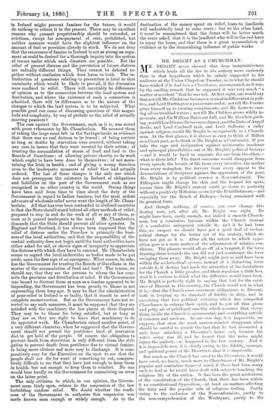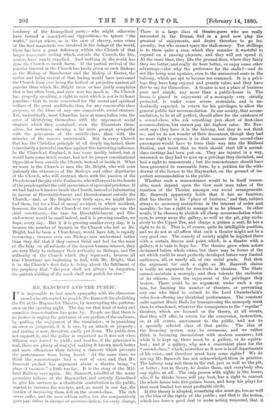MR. BRIGHT AS A CHURCHMAN.
MR. BRIGHT never showed that deep imaginativeness which lends all the fire to his oratory more curiously than in that hypothesis which he calmly suggested to his audience at the Union Chapel on Tuesday, as to what he should have wished if he had been a Churchman, accompanied, as it was, by the smiling remark that ho supposed it was very much "a matter of accident " that he was not. At first sight, one would say that not till Mr. Gladstone becomes a cynical indifferentist in poli- tics, and Lord Hartington a passionate zealot; not till Mr. Forster gives himself up to turning compliments, and Mr. Lowe to cast- ing oil on troubled waters ; not till Mr. Childers grows wildly in- accurate, and Sir William Harcourt dull, and Mr. Goschen gush- ing; not till Lord Granville becomes clumsy, and the Duke of Argyll docile, and Lord Cardwell rash, and Lord Selborne a railer against religion, would Mr. Bright be recognisable as a Church- man. At the first glance, it is almost as easy to think of Milton as a Court poet, as to think of Mr. Bright as a Conformist. If you take the rage and indignation against aristocratic insolence and episcopal plausibilities out of Mr. Bright's political history, —and it would be hard to separate the one from the other,— what is there left ? The finest sarcasms would disappear from every speech, the breath of life from every invective, the motive from every metaphor, the fervour from every appeal to the denunciations of Scripture against the oppressors of the poor. Mr. Bright is by political essence a Nonconformist. The Ethiopian might change his skin and the leopard his spots, sooner than Mr. Bright's oratory could go down to posterity without a positively Miltonian scorn for the Establishment,—and especially for the Bench of Bishops,—being associated with its greatest feats.
And though nothing, of course, can ever change this destiny now, yet, after all, Mr. Bright was right. He might have been, easily enough, not indeed a smooth Church. man, but a combative layman within the Church instead of a combative antagonist outside it; and if he had been this, we suspect we should have got a good deal of ecclesi- astical change for the better out of his oratory, which we have not got as it is. After all, the extent to which oppo- sition goes is a mere matter of the adjustment of relative con- ditions. The planets would all go off at a tangent, if the force drawing them towards the sun did not just counteract the force swinging them away. Mr. Bright might just as well have been within the ecclesiastical system, instead of a disturbing force outside it, if destiny had made the attraction of his forefathers for the Church a little greater, and their repulsion a little less. And it is curious to think what the difference would have been. Mr. Bright is perfectly right in saying that but for the exist- ence of Dissent in this country, the Church would not be what it is,—that the Church owes enormous obligations to Dissent, both in keeping up its standard of fidelity to duty, and in exercising that free political criticism which has compelled Churchmen to enlarge their spirit, and to put off that pious and petty air of privileged sanctity which assumes that every- thing inside the Church is sacramental, and everything outside it common and unclean. In our own day, it is impossible, we suppose, that even the most narrow-minded clergyman alive should be careful to parade the fact that he had dissuaded a mob from attacking a Dissenter's house only because his wife's sister was ill, and he feared that the noise might injure the patient,—as happened in the last century. And if it is impossible now, it is chiefly owing to the fidelity, courage, and spiritual power of the Dissenters that it is impossible.
But much as the Church has owed to the Dissenters, it would have owed, we fancy, much more to Churchmen of Mr. Bright's popular and combative frame of mind, if there had been many such to deal as he would have dealt with subjects touching the religious life of the nation. It has been the great misfortune of the constitution of the Church, that there has been within it no constitutional Opposition,—at least on matters affecting the laity and the popular side of religious feeling. Partly owing to the exclusion of the Nonconformists, partly to the non-comprehension of the Wesleyans, partly to the
tendency of the Evangelical party,—who might otherwise have formed a constitutional Opposition,—to ignore "the world," except where, as in the case of slavery, some crime of the first magnitude was involved in the doings of the world, there has been a great deficiency within the Church of that larger democratic feeling which, outside the Church, the Dis- senters have amply supplied. And nothing in the world has done the Church so much harm. If the partial revival of the popular interest in the Church has lately given us such Bishops. as the Bishop of Manchester and the Bishop of Exeter, the earlier and fuller revival of that feeling would have prevented the Church from ever being the hotbed of prejudice against all popular ideas which Mr. Bright more or less justly complains that it has often been, and even now too much is. No Church has, properly speaking, a right to exist which is not in its heart popular,—that is, more concerned for the moral and spiritual welfare of the great multitude, than for any conceivable class purpose, or the ideas of any one conceivable social stratum. Yet, undoubtedly, most Churches have at times fallen into the error of identifying themselves with the uppermost social stratum which they contained, even the Dissenters them- selves, for instance, showing a far more prompt sympathy with the grievances of the middle-class, than -with the miseries of the masses underneath. But in every Church that has the Christian principle at all deeply implanted, there is inevitably a powerful reaction against this narrowing influence. In the Church of England, it has-come tardily indeed, but it would have come much sooner, had not its proper constitutional Opposition been outside the Church, instead of inside it. What we want in the Church is men like Mr. Bright, who will scan jealously the utterances of the Bishops and other dignitaries of the Church, who will contrast them with the passion of the Prophets andthe pity of the Psalmists, who will appeal to the hearts of the people against the cold insouciance of episcopal prudence. If we had had such leaders inside the Church, instead of fulminating in favour of Disestablishment and Disendowment outside the Church,—and, as Mr. Bright very truly says, we might have had them, but for a kind of moral accident, in which accident, however, the fault of the Church of two centuries ago was the chief constituent,—the case for Disestablishment and Dis- endowment would be small indeed, and it is growing smaller, we hope, every day. But if it is growing smaller every day, it is because the number of laymen in the Church who feel as Mr. Bright, had he been a Churchman, would have felt, is rapidly increasing ; because even our Bishops now understand better than they did that if they cannot think and feel for the mass of the laity on all subjects of the deepest human interest, they are very likely to endanger their authority as Bishops, and the authority of the Church which they represent ; because all true Christians are beginning to feel, with Mr. Bright, that it is the Church's first duty to bring about the fulfilment of the prophecy that " the poor shall not always be forgotten, the patient abiding of the meek shall not perish for ever."



































 Previous page
Previous page